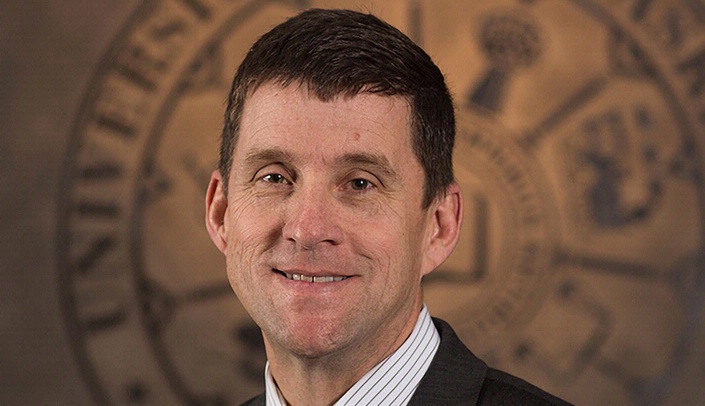The University of Nebraska Board of Regents on Thursday approved a 2018-19 operating budget that holds spending growth to near zero as NU implements significant cuts while simultaneously working to grow its impact on Nebraska’s economy and quality of life.
The $962 million state-aided budget, virtually flat compared to 2017-18, depends on $22 million in administrative cuts identified by the university-wide Budget Response Teams, plus $6 million in programmatic cuts identified by the campuses, to manage three rounds of state funding reductions in the past 14 months.
In remarks to the Board of Regents, President Hank Bounds, Ph.D., praised the work of Budget Response Team members whose efforts have helped address an initial $49 million shortfall by cutting jobs and spending in areas like information technology, human resources, purchasing, and energy and facilities.
The BRT cuts — equivalent to an 8 percent tuition increase — have protected, to the greatest extent possible, the university’s highest priorities of affordability and academic excellence, even as they have resulted in more than 100 lost jobs and disruptions across the campuses.
In fact, Dr. Bounds said, the teams’ work is one reason the University of Nebraska has had a “spectacular couple of years” despite its budgetary challenges.
“Many institutions hunker down during times of crisis,” Bounds said. “None of us (the chancellors and I) have any interest in doing that. Our interest is around making this a better institution, growing this university, growing our research portfolio, growing our student population, keeping the best faculty here and attracting more as we move forward.
“We’ve been focused on getting better in spite of really challenging circumstances.”
Recalling advice he received earlier in his career about how to react when life produces lemons, Dr. Bounds added: “We’ve been busy making lemonade here at the University of Nebraska.”
Injecting a “dose of realism” about the impact that further cuts in state funding would have on the university’s upward trajectory, Dr. Bounds said: “I worry about our ability to continue to have those kinds of announcements if the next two years look like the past two years.”
Even if the university’s state appropriation were held flat in the next two-year budget cycle, mandatory cost increases like collective bargaining, health insurance and utilities would create a $64 million recurring shortfall. Given the administrative cuts that have already been made and NU’s use of cash to manage the current challenge, Dr. Bounds has said further reductions “would require us to have a candid conversation” about what kind of university Nebraskans want.
The budget approved by the Board authorizes Bounds to implement a midyear tuition increase if university appropriations are withheld in 2018-19. State appropriation allotments were held back by 2 percent in both 2016-17 and 2017-18. Gov. Pete Ricketts has agreed to communicate to Bounds by Oct. 31 whether appropriations will be withheld.
A midyear tuition increase on top of the 3.2 percent increase previously approved by the Board would be an unpleasant but necessary step if the university’s 2018-19 appropriation is reduced further, Dr. Bounds said: “We are out of quick options.”
The 3.2 percent tuition increase amounts to $6.25 to $7.50 more per credit hour for most resident undergraduates. Costs at NU campuses continue to be well below the peer averages, and Bounds said the university’s goal is to continue to ensure that higher education is affordable and accessible for Nebraska families.
The budget also includes a 1.75 percent increase in the salary pool for non-bargained employees, to be distributed on the basis of merit.
The president and chancellors now turn their focus to developing a 2019-21 state funding request to bring to the Board of Regents in August. In addition to core needs like compensation, health insurance and utilities, Dr. Bounds said university leadership also will consider what kinds of investments might support NU’s efforts to expand access for students and grow Nebraska’s economy and workforce.
College graduates are much more likely to be civically engaged, be healthy, read to their children and “do all the things that ensure that they are productive citizens and that their children and grandchildren are productive citizens,” Bounds noted.
He told regents that as the university considers its biennial budget request, it will consider its responsibility to make certain more Nebraskans are on that path: “You are likely to see a thoughtful recommendation around student financial aid that would be hyper-focused on the workforce needs of the state.”
